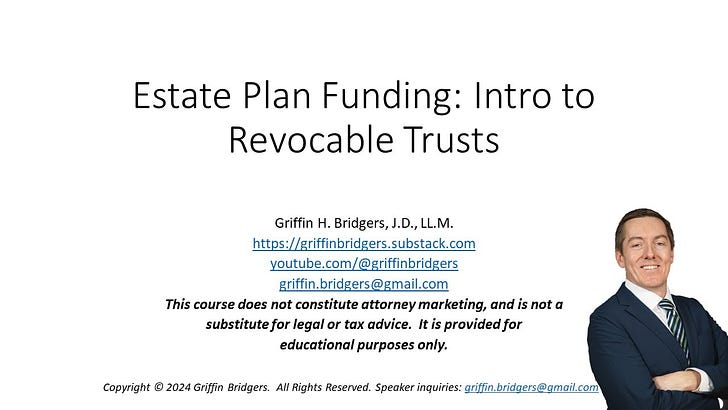A "Better" Guide to Estate Plan Funding, Part 4: Intro to Revocable Trusts
Myths, basic requirements, and the most common error with respect to this funding vehicle
This is Part 4 of the series on funding the estate plan. For the first part of this series and a series index, click here.
Table of Contents
Intro
Today I start with a bit of a soapbox. Revocable trusts are useful, but most often they are used by attorneys and advisors to undermine our competitors and each other. We often think we are doing the client a service by articulating our special brand of “what everybody else is doing wrong,” but I would argue that this does not serve the client’s interests.
So, while it is perhaps too naïve and idealistic, my hope is that I can perhaps encourage my peers in all wealth transfer industries to abandon some of the polarizing views on revocable trusts. They are valuable tools, like hammers, but not everything in the estate planning world is a nail. Despite what LinkedIn or TikTok might tell you, the lack of a revocable trust won’t cost you millions in attorneys’ fees, and the use of a will instead of a revocable trust is not the result of some conspiracy by attorneys to charge you way more (which, as I previously explained, may be a red herring or misdirection to avoid criticism of one’s own fee practices).
That being said, this video and slides (found below for paid subscribers) start with three common myths for revocable trusts that are incomplete or misleading:
That funded or unfunded revocable trusts avoid probate;
That revocable trusts cut down on time to administer the estate; and
That revocable trusts are private.
From there, the materials cover some of the basic elements and requirements for revocable trusts, including the flexible aspects that make them ideal when compared to wills and beneficiary designations. I also discuss perhaps the biggest error I see when amending, funding, or even replacing the operating document of, a revocable trust.
Video
Keep reading with a 7-day free trial
Subscribe to State of Estates to keep reading this post and get 7 days of free access to the full post archives.




